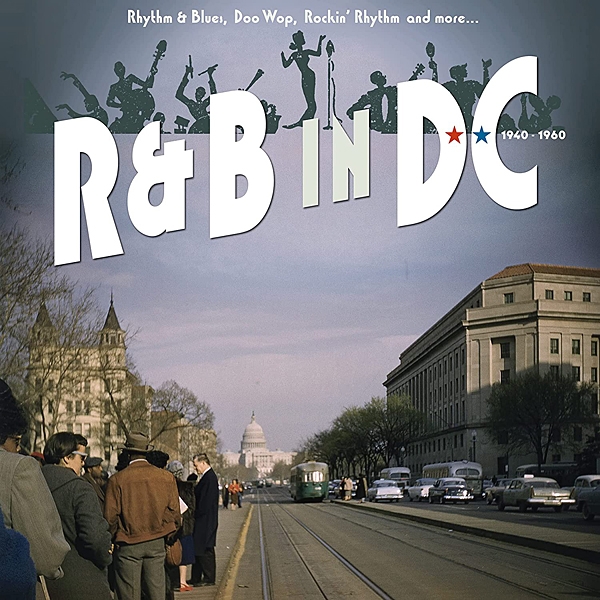| Columns Retired Columns & Blogs |
How much is Go-Go? Can't talk the DC music scene without it.

One of the great ironies of the story is that very little music was recorded in the District of Columbia due to lack of a music-business infrastructure, even though DC was where the industry itself began— arguably—with Alexander Graham Bell's invention of the Graphophone at Volta Laboratories in Georgetown. With recording labs based in DC, area artists were well represented at the dawn of the recording age, but, as Bruder notes, no commercial record company operated in the city between 1900 and 1944. "During the 1920s and 1930s," he writes, "Washington artists had to leave town to make a record."
Even so, the Washington, DC, area was home to many Black musicians, nurtured by a school system that provided excellent music education and a vibrant club and theater scene. The book walks us through the history of the indie labels that began recording DC R&B in the mid-1940s. The companies were run by eccentric entrepreneurs who were usually enthusiasts, not businesspeople. The recordings themselves are often primitive; during the 1940s, vocal groups were making drugstore acetates in recording booths, and the earliest professionals were using only slightly more advanced technology.
A lot of the more successful recordings by DC artists were leased to or recorded by bigger companies. There is no identifiable "DC sound." We hear Washingtonians working out of gospel, vocal group, and swing-era traditions as they head inexorably into rock'n'roll.
Lillian Claiborne, co-founder of DC Records, looms over this scene beginning in 1947. Over the following two years, she released 50 78rpm discs by local groups including the Progressive Four, led by vocalist Harmon Bethea, who would later resurface in the Cap-Tans and other groups. Claiborne had an unusually close relationship with her artists, taking care of their publishing, arranging local live bookings, and licensing their recordings. "For three decades," writes Bruder, "she was the person to see if you wanted to make a record in DC." Claiborne persuaded two very popular local musicians, Frank "Dual Trumpet" Motley and drummer T.N.T. Tribble, to join forces.
Starting with the raucous 1951 party anthem "Bow Wow Wow," Motley and Tribble released a series of records, together and separately, some featuring local star Angel Face, a New Orleans–born vocalist. "Little House Party" (1952) evokes a raucous night out; "T.V. Boogie Blues" (also '52) showcases future Basie-ite Frank Wess on tenor saxophone; Motley's "Honkin' At Midnight" ('55) offers another party scene; Tribble cut the Shag anthem "Madison Beat Part I & II" ('59); Tribble's terrific "I Get My Kicks in the Country" ('52) includes a take on the animal-centric tune known as "They All Ask'd for You," later famously recorded by the Meters.
Ahmet Ertegun's legendary stewardship of New York–based Atlantic records made him one of the most powerful figures in the music industry, but he began his career with the small, unsuccessful DC label Quality Records. Ahmet and his older brother Nesuhi lived in DC, where their father served as an ambassador from Turkey. The brothers were avid traditional jazz fans, well-versed in the local music scene. In '46, Ahmet partnered with Herb Abramson of Jubilee Records and Max "Waxie Maxie" Silverman, owner of the Quality Music Store. They named the label Quality Records after Maxie's store.
Their only release, "Thursday Evening Blues," went nowhere. A year later, Ertegun started Atlantic with Abramson and investment capital from DC dentist Dr. Vahdi Sabit. DC artists The Clovers and Ruth Brown figured prominently in Atlantic's early success, and the legendary 1957 "Bip Bop Bip," recorded by Don Covay as "Pretty Boy" with Little Richard's backing band, was brought to Atlantic by Sabit. The track is the veritable definition of Black garage rock. The great Barrence Whitfield opened his 1984 debut album with it.
Lloyd Price, a teenage sensation out of New Orleans after his discovery by Dave Bartholomew, revived his career upon moving to DC after his discharge from military service. In 1956, Price formed KRC Records. The first release, "Just Because," was an immediate hit. Price soon discovered that distributors would order records from indies but wouldn't pay for them. Price licensed "Just Because" to Paramount while the disc still had life. It peaked at #3 on the R&B charts and #29 on the pop charts.
Bo Diddley was also in DC during the late '50s, cutting sides in his home studio. That's Diddley on guitar with his band backing up the great Washington vocalist Billy Stewart on "Billy's Heartache"/"Baby You're My Only Love" ('57). Diddley also plays on the '57 Marquees releases "Wyatt Earp" and "Hey Little School Girl."
Sonically, the 16 discs can be tough slogging. Many of the recordings are compromised by inferior production and crude reverb. And yet, as Bruder points out, those same recordings are notable for the emotional depth of the performances, and many of the tracks have a "live" sound. Doug Pomeroy handles the thankless job of remastering to make it all hang together; his painstaking work makes the package at least listenable. In any case, it's worth it, since there's no denying that this collection casts light on the secret history of music culture in one of America's most important Black communities.

How much is Go-Go? Can't talk the DC music scene without it.